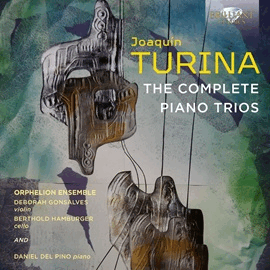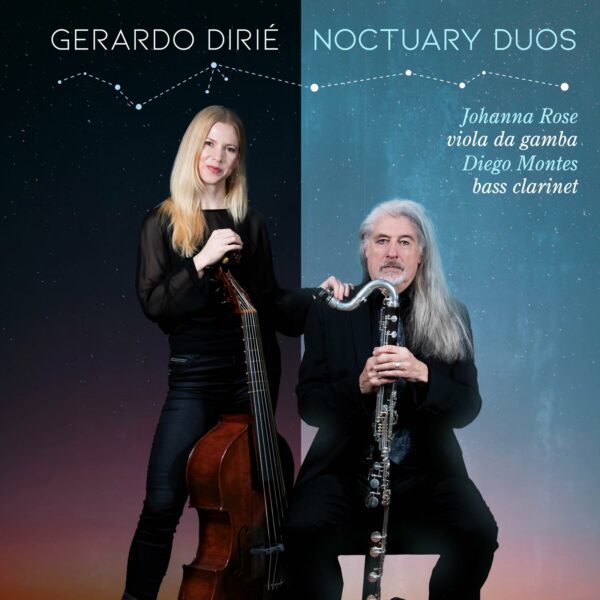Der in Córdoba, Argentinien, geborene Komponist, Dozent und Wissenschaftler Gerardo Dirié wurde in Argentinien und in den USA ausgebildet. Inzwischen hat er in Brisbane, Australien, einen Forschungs- und Lehrauftrag angenommen. Er setzt sich insbesondere dafür ein, die lateinamerikanische Kunstmusik einem breiteren Publikum nahezubringen.
Die Noctuary Duos widmen sich Klangwelten wechselnder Farbtöne, mit rätselhafter Lyrik und dramatischen Verläufen. Dabei inspirierten den Komponisten die rätselhafte Schönheit des Nachthimmels sowie das reiche astronomische Wissen der Aborigines und Torres-Strait-Insulaner. Es gelingt Dirié, sowohl gregorianische Gesänge wie auch Heavy Metal in diesen Duos ebenso zu verbinden wie ein Zitat von Stephen Hawking mit Anspielung auf die Teilchenphysik einzubinden. Das Werk ist zugleich verspielt und reflektierend und regt den Hörer an, über seinen Platz im Kosmos nachzudenken. Ergänzt werden diese Schutzgebiete um weitere für die beiden Musiker komponierte Stücke.
Die Kompositionen sind eng mit den besonderen Charakteren der Musiker verbunden, mit denen er zusammengearbeitet hat. Dazu gehören auch die Gambistin Johanna Rose und der Klarinettist Diego Montes. Duos und auch Soli dieser beiden Interpreten ergeben das vorliegende Album. Die Musik für dieses Duo entstand aus dem Staunen, der Ehrfurcht und dem tiefen Gefühl, Teil des Universums zu sein.
Die Kombination der Gambe mit der Bassklarinette ist ungewöhnlich. Zumal für die Viola da Gamba vor allem bis ins 18. Jahrhundert komponiert wurde, die Bassklarinette in Vorformen erst Ende jenes Jahrhunderts und in der heutigen Form erst im Folgenden konstruiert wurde. Das Zusammenspiel entpuppt sich dann allerdings als reizvoll, da beide Instrumente mit einem gedämpften, leicht nasalen Ton eine gute stimmliche Ergänzung zueinander bilden. Ein Reiz aus dem Gegensatz der Charaktere andererseits entfällt damit.
Mit ihrer wunderbaren Tongebung gelingt es Johanna Rose, die Vielseitigkeit der Gambe zu zeigen. Dabei gelingt es ihr, den subtilen Klang des Instruments mit runder Tongebung, die sie auch sehr nuanciert auslotet, zu facettenreicher musikalischer Gestaltung einzusetzen, so dass sie die Schattierungen der Werke wirkungsvoll abstuft.
Diego Aníbal Montes, wie Dirié aus Argentinien stammend, entlockt der Bassklarinette eine kaum für möglich gehaltene stimmliche Breite, die die Möglichkeiten des sonst oft im Ensembleklang eingebundenen Blasinstruments von seiner besten Seite zeigt. Im Duo mit Johanna Rose entwickeln sie eine erstaunliche Bandbreite an Kraft und Zartheit. So gelingt es ihnen, diese Kombination zu einer anregenden Reise zu formen, bei der man träumen kann.
Born in Córdoba, Argentina, composer, lecturer and researcher Gerardo Dirié was educated in Argentina and the USA. He has since accepted a research and teaching position in Brisbane, Australia. He is particularly committed to bringing Latin American art music to a wider audience.
The Noctuary Duos are dedicated to soundscapes of changing hues, with enigmatic lyricism and dramatic progressions. The composer was inspired by the enigmatic beauty of the night sky and the rich astronomical knowledge of the Aborigines and Torres Strait Islanders. Dirié succeeds in combining both Gregorian chants and heavy metal in these duets, as well as incorporating a quote from Stephen Hawking alluding to particle physics. The work is both playful and reflective and encourages the listener to think about their place in the cosmos. These protected areas are complemented by other pieces composed for the two musicians.
The compositions are closely linked to the special characters of the musicians he has worked with. These include the gambist Johanna Rose and the clarinettist Diego Montes. Duos and solos by these two performers make up this album. The music for this duo was born out of wonder, awe and the deep feeling of being part of the universe.
The combination of viola da gamba and bass clarinet is unusual. Especially as the viola da gamba was mainly composed for up until the 18th century, while the bass clarinet was only constructed in preliminary forms at the end of that century and in its current form only later. However, the interplay turns out to be charming, as both instruments with a muted, slightly nasal tone form a good vocal complement to each other. On the other hand, the contrast between the characters is no longer appealing.
Johanna Rose knows how to tease out the versatility of the viola da gamba with her wonderful tone. She succeeds in using the subtle sound of the instrument with a round tone, which she also explores in a very nuanced way, to create a multi-faceted musical design, effectively grading the shades of the works.
Diego Aníbal Montes, who like Dirié comes from Argentina, elicits a vocal breadth from the bass clarinet that was hardly thought possible, showing the possibilities of the wind instrument, which is otherwise often integrated into the ensemble sound, at its best. In duo with Johanna Rose, they develop an astonishing range of power and delicacy. They succeed in shaping this combination into a stimulating journey in which one can dream.


















